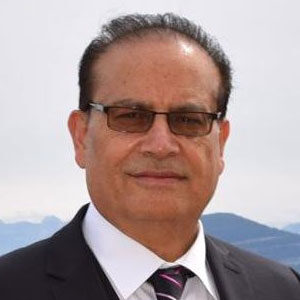
 Qamar Bashir
Qamar Bashir
In one of his recent interviews, Ishaq Dar emphasized the necessity of strict fiscal and financial discipline for the country’s future financial layout. He pledged to bring the previously untaxed real estate sector into the tax net. He mentioned his ousting in 2017, implying that his efforts to firmly impose financial discipline and tax the real estate sector were the reasons behind it. This move was perceived as an attempt to control the defense budget and regulate the real estate sector, which is often associated with influential entities.
Dar’s assertive stance cost him the finance ministerial position, despite being the favored choice of the PML(N) government and enjoying unwavering support from Nawaz Sharif. His removal from contention for the finance ministry effectively ended his career in that capacity and marked the elimination of staunch supporters and loyal colleagues of Nawaz Sharif.
Furthermore, Dar’s expulsion from power sent a clear message to the PML(N) government, Nawaz Sharif, and Shahbaz Sharif, asserting the dominance of those in power. It served as a warning for them to remain compliant or face consequences, including the threat of exposing electoral irregularities and potentially losing their majority in the National and provincial assemblies. Such actions could lead to public humiliation and international criticism for undermining the electoral process, a risk that neither PML(N) nor PPP would be willing to take, thus ensuring their compliance throughout their tenure in power.
The selection of a Minister for Finance from the private sector or a politician nominated by a political party carries distinct advantages and disadvantages. A finance minister from the private sector brings expertise in financial management and economics, offering potential for efficiency and market confidence. However, they may lack political experience and accountability to the electorate, potentially leading to disconnect from public needs and resistance from bureaucratic structures.
On the other hand, a politician-appointed finance minister brings political acumen and representation, ensuring policy continuity and facilitating coalition building. Yet, they may face pressures of political interference, partisanship, and patronage, potentially compromising technical expertise and leading to suboptimal outcomes.
In both cases, the precarious and fragile economic and financial outlook of the country will not be a bed of roses for the new incumbent of the finance ministry, most likely a renowned banker from the private sector, which is also a vote of no confidence on the political nominees of the coveted slot.
Soon after assuming power, the new finance minister, amongst other pressing challenges, will be faced with a daunting challenge of macroeconomic and fiscal consolidation given that Pakistan’s macroeconomic landscape is marked by several critical challenges. It grapples with a burgeoning external debt burden, which stood at around $126.3 billion by the end of 2022, significantly straining its financial resources.
This is compounded by a persistent fiscal deficit, which has hovered between -7.6% and -7.8% of GDP for last many year until it was brought down by stringent measures of the interim government from Rs 945.3 billion last year to Rs. 112.0 billion during Jul-May FY2023. The current account has posted a deficit of $2.6 billion for FY2023, a reduction from the previous year’s deficit of $17.5 billion reflecting a stark imbalance between imports and exports.
The Pakistani Rupee has also experienced significant depreciation, moving from around 115 PKR per USD in early 2018 to over 307 PKR per USD in recent times, which increases the cost of imports and debt repayments. Furthermore, Pakistan’s foreign exchange reserves have been critically low, with figures around $8 billion at points in 2023, barely covering a few months of imports. The banking sector faces its own set of challenges, with non-performing loans and substantial exposure to government debt, indicating a sizable portion of banks’ assets tied up in government securities.
The challenge of reigning historic high inflation rates will remain high on the agenda of the government. Though due to stringent measures of the interim government Consumer Price Index (CPI) inflation has declined to 29.4 percent in the month of June 2023 from 38.0 percent recorded in May 2023, the food inflation (urban) has declined from 48.1 percent to 40.8 percent, sensitive price indicator (SPI) also declined by 0.07 percent on the week ended 20th July, 2023 but the inflation nonetheless remain very high which is affected the entire population of the country especially the most vulnerable, poor and middle and middle middle classes of the society.
These macroeconomic anomalies have translated to real challenges for the Pakistani people. It has reduced economic activity and rising prices has disproportionately affected lower-income groups, pushing them further into poverty and widening the wealth gap.
Inflation makes basic necessities like food and healthcare less affordable, impacting health and well-being. Stagnant or declining economic activity translates to fewer jobs and lower wages, hindering upward mobility and reducing overall quality of life The volatile economic environment creates anxiety and uncertainty for individuals and families, impacting mental health and overall well-being.
To navigate its challenges, the new government of Pakistan should adopt a stratified approach, categorizing macroeconomic interventions into short, medium, and long-term programs.
In the short term, immediate fiscal consolidation is crucial, entailing spending cuts on non-essentials and improved tax collection efforts to reduce the budget deficit. Concurrently, monetary policy may need tightening to control inflation, by maintaining a tight monetary policy stance to curb inflation and ensure it returns to more moderate levels. A market-determined exchange rate is also essential to buffer external shocks, rebuild foreign reserves, and support competitiveness and growth coupled with actions to ensure exchange rate stability and immediate measures to mitigate energy sector losses.
Short term measures should also include implementing cost-side power sector reforms to improve the sector’s viability and protect fiscal sustainability. Regularly scheduled adjustments in electricity and natural gas prices should continue to bring them closer to costs.
Over the medium term, comprehensive tax reform to broaden the tax base and energy sector restructuring will be vital. The government should prioritize efforts to mobilize additional revenues, particularly from non-filers and under-taxed sectors. This can help create fiscal space for further social and development spending.
Strengthening public financial management is also essential to ensure efficient utilization of resources. Continued spending discipline is crucial to achieving budgetary targets. Efforts to control non-priority spending, including provincial spending, should be sustained to ensure that budgeted primary surplus and debt goals remain achievable.
Action should be taken to address undercapitalized financial institutions and ensure financial stability. Vigilance over the financial sector is crucial to safeguarding against potential risks. This period should also see the initiation of state-owned enterprise restructuring and efforts to strengthen the financial sector, enhancing its resilience and access to credit, especially for small and medium-sized enterprises.
In the long run, Pakistan’s focus should shift to broad structural reforms, a key to boosting employment and ensuring inclusive growth. This includes improving the business environment, leveling the playing field for investors, advancing state-owned enterprise (SOE) reform agenda, strengthening governance and anti-corruption institutions, and building climate resilience. The reform should also be introduced in labor markets, education, and healthcare to enhance productivity and competitiveness.
Long term measures should necessarily include reevaluation of existing trade and investment policies to create a conducive environment for foreign direct investment, alongside significant investments in infrastructure and human capital, will lay the foundation for sustained economic growth.
This phased approach requires meticulous planning, steadfast policy implementation, and ongoing adjustments, with stakeholder engagement at each step to ensure these programs’ effectiveness and sustainability.
Writer is Former Press Secretary to the President,Former Press Minister to the Embassy of Pakistan to France ,Former MD, SRBC






